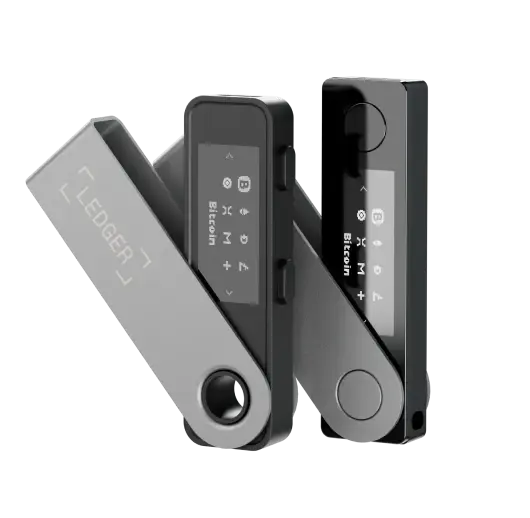Compare Ledger signers
Get a Ledger Nano
Select and purchase a Ledger hardware wallet of your choice.
- Beginner in the crypto world? Get started with Ledger Nano S Plus.
- Prefer a Bluetooth connection? Try with Ledger Nano X.
Looking for a Komodo Wallet to buy and store your Komodo? Join 7+ million customers who trust Ledger hardware wallets to securely store their crypto and use them on the day-to-day basis.
Trusted by over 8 million customers

Whether you’re looking to keep your crypto safe for long-term or manage them on a daily basis, Ledger has the right product for you.
Ledger hardware wallet
Ledger hardware wallet stores your private keys and signs transactions offline, making them resistant to malicious attacks and threats. Pair the Ledger crypto wallet with Ledger Live App to manage your Komodo on the go.
Ledger Live App
Ledger Live App is a gateway to manage your assets, checking your real-time balance, tracking transaction histories, and more.

Select and purchase a Ledger hardware wallet of your choice.

Download and install the Ledger Live app in a couple of clicks on desktop and mobile.
Coupled with a Ledger, it makes the most secured wallet for your Komodo.

Add a Komodo account with a couple of clicks. Choose among different providers and easily manage your Komodo.
And not only Komodo. With Ledger Live, you can manage thousands of crypto and a large variety of NFTs.

The most premium secure touchscreen hardware wallet to protect and manage your Komodo.

Designed with accessible sizing, enjoy the all new secure touchscreen user experience to manage your Komodo.

Our classic entry-level hardware wallets built with all the essentials to secure your Komodo.

With Ledger Live coupled with a Ledger, you can:
*Buy, send/receive, swap, stake, and other crypto transaction services are provided by third-parties provider, which availability may vary based on jurisdiction/territory.

Komodo is a multi-chain blockchain platform, which has roots as an early pioneer in the interoperability of blockchain networks. Komodo’s flagship feature is its Antara Smart Chain Composer, which is a web application for customizing and deploying application-specific smart contracts on the network.
Komodo caters primarily to enterprises and businesses seeking to leverage the power of smart contracts, and functions as an open platform with several white label products available to users such as a DEX, crowdfunding app, and multi-coin wallet.
Find answers to some of the most common questions.
Related Resources